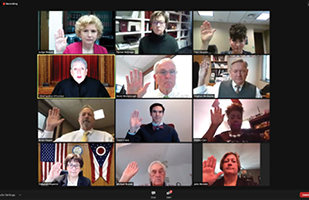Municipal, County Court Judges Discuss Substance Abuse, Social Media

Chief Justice Maureen O’Connor administered the oath of office to the 2021 officers of the Association of Municipal/County Judges of Ohio (AMCJO).

Chief Justice Maureen O’Connor administered the oath of office to the 2021 officers of the Association of Municipal/County Judges of Ohio (AMCJO).
The global pandemic has forced countless meetings and seminars to be held using remote technology and the annual municipal and county judges’ winter conference was no different.
One hundred eighty-one municipal and county court judges in Ohio attended the two-day conference held via Zoom technology.
“I was surprised at how efficient the presentation was delivered using the remote format,” Niles Municipal Court Judge Chris Shaker said. “I know I’m probably in the minority, but I felt that I learned as much if not more than if I were live at a conference. The speakers were top notch as always.”
“The questions asked were straightforward and answers were given promptly. I am a big fan of the remote alternative. As a single court judge without a magistrate it was so convenient to be able to attend the conference remotely,” he said.
Ohio Supreme Court Chief Justice Maureen O’Connor administered the oath of office to the municipal and county court judges elected to leadership positions by the membership of their association.
The 2021 officers of the Association of Municipal/County Judges of Ohio (AMCJO) include:
- Marion Municipal Court Judge Teresa Lyn Ballinger, president
- Rocky River Municipal Court Judge Brian Hagan, first vice president
- Chardon Municipal Court Judge Terri Stupica, second vice president
- Darke County Municipal Court Judge Julie Monnin, secretary
- Retired Franklin County Judge Michael Brandt, treasurer
- Clark County Municipal Court Judge Denise Moody, past president
Experts addressed the science behind substance abuse and the effects of methamphetamine and cocaine treatment for those who suffer from stimulant disorders.
“Science and compassion are necessary tools to have when faced with cases that have their origin in addiction,” Chief Justice O’Connor told the group. “Being an understanding judge doesn’t make you a soft judge. It means you grasp the science of addiction and aren’t spinning your wheels and wasting time on old practices that don’t work.”
The judges also learned about how the rules of evidence apply to electronically stored information and social media posts.
The remote conference allowed some judges to multi-task.
“The webinars permit me to tend to daily tasks at the court while still participating in the webinars,” Oberlin Municipal Court Judge Tom Januzzi said.
“I watched the webinar on a laptop while keeping my personal computer open to view the materials and even check a couple of citations on Westlaw,” he said. “Even though I prefer the in-person seminars, the webinars have several advantages including economic savings, travel and time savings.”


